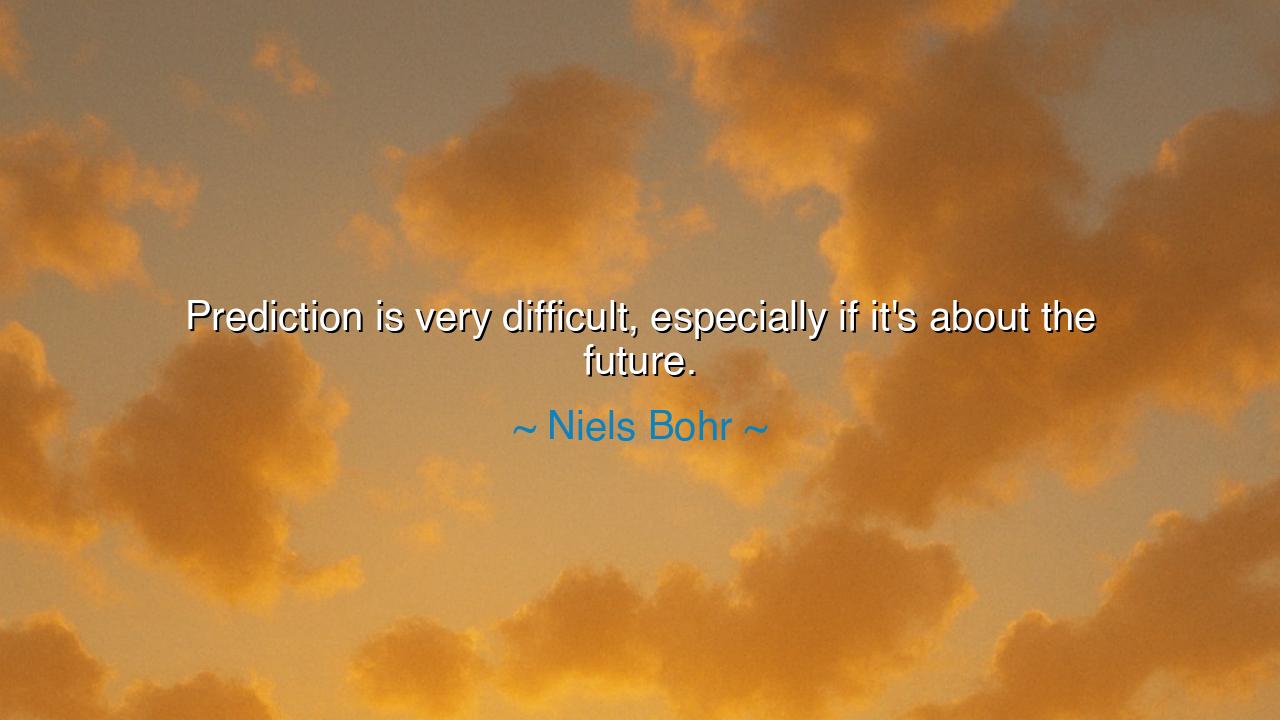
Prediction is very difficult, especially if it's about the






In the vast sea of uncertainty that stretches before us, Niels Bohr’s words, “Prediction is very difficult, especially if it’s about the future,” ring with profound truth. The future, elusive and unseen, is a realm that has captured the hearts and minds of thinkers for millennia. We long to know what lies ahead, to predict our fate and the fate of the world. Yet, Bohr, one of the greatest minds of the 20th century, understood that despite our best efforts, the future remains beyond our reach, like a mysterious horizon that shifts with every step we take. The very act of predicting it, Bohr warns, is fraught with difficulty—especially because the future is shaped by forces far beyond our ability to foresee.
The ancients too were aware of the limitations of human foresight. In ancient Greece, the oracle of Delphi was revered for its prophecies, yet even the most gifted soothsayers were constrained by the limits of knowledge. Socrates, the great philosopher, believed that true wisdom was found in recognizing one’s own ignorance—understanding that the complexities of life could never be fully comprehended. The ancient Greeks understood that the future was like a river: it flows in directions that are determined by unseen forces, and while one might attempt to predict its course, the fluid nature of time makes such predictions elusive and uncertain. Bohr’s quote echoes this ancient wisdom, revealing the humbling truth that we are limited in our ability to foresee the twists and turns of life.
Consider the example of Alexander the Great, whose vision of empire stretched across vast lands, yet whose future was shaped not only by his military brilliance but by the whims of fate. Alexander’s untimely death at a young age shattered any predictions about his continued conquests. Historians, at the time and afterward, could not have foreseen how his death would send his empire into turmoil, breaking into fragments instead of solidifying his vision for lasting glory. His story reveals the inherent unpredictability of the future—no matter how grand the vision or how precise the strategy, the future remains a land full of uncertainty and potential for unexpected shifts.
In modern history, we can see similar examples of predictions gone awry. The fall of the Berlin Wall and the sudden collapse of the Soviet Union were events that defied the predictions of even the most seasoned political analysts. During the Cold War, few could have foreseen that a peaceful end to this decades-long standoff would unfold so swiftly. Leaders like Ronald Reagan and Mikhail Gorbachev, despite their powerful positions, could not predict how quickly the Soviet regime would disintegrate, nor the global shifts that would follow. The unexpected nature of such events serves as a modern-day reminder of Bohr’s wisdom: that predicting the future is not just difficult—it is fraught with unknowns that often elude our comprehension.
The core lesson in Bohr’s words is one of humility and acceptance. While we may strive to predict and control the future, the reality is that the future is a canvas yet to be painted, shaped by forces far beyond our understanding. This is not to say that we should abandon all attempts at foresight or planning, but rather that we must approach the future with a sense of flexibility and adaptability. The future is not something we can hold in our hands, but something we must engage with as it unfolds. Just as a great captain adjusts the sails to the changing winds, so must we navigate life’s journey, adjusting our course as circumstances evolve.
In our own lives, we must learn to embrace uncertainty. While we can make informed decisions based on the past and present, we must also acknowledge the unknown elements of life that cannot be predicted. Planning is important, but it should be tempered with the understanding that unexpected events will inevitably shape our path. Just as Bohr and the ancients taught us, there is wisdom in recognizing our limitations, in understanding that certainty is a luxury we do not always possess. Instead, we must remain open to the possibilities the future holds, with an open mind and resilience in the face of the unknown.
Thus, the true strength lies not in our ability to predict the future with absolute certainty but in our ability to adapt, to learn from the unfolding moments of life, and to embrace the mystery of what is to come. The future, like the wind, cannot be controlled, but we can learn to navigate it with grace, wisdom, and awareness. Bohr’s wisdom calls us not to fear the unknown, but to understand that it is in our ability to respond to the unpredictable that we find our true power and purpose.






AAdministratorAdministrator
Welcome, honored guests. Please leave a comment, we will respond soon